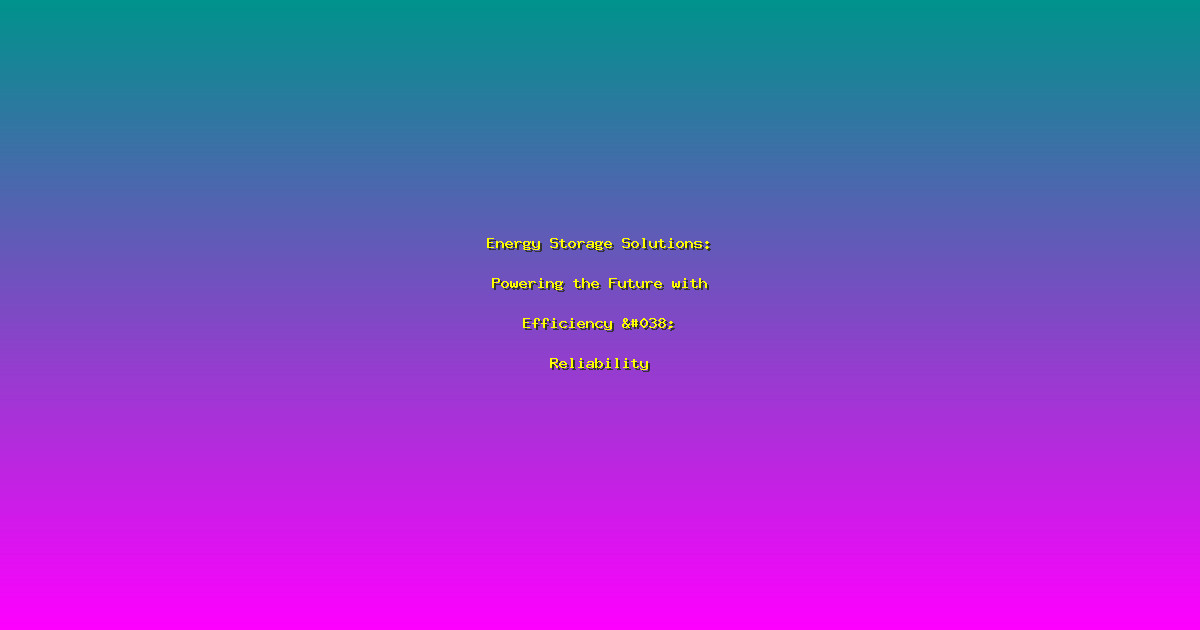Energy Storage Solutions: Powering the Future with Efficiency & Reliability
As the world increasingly shifts towards renewable energy, the need for efficient and reliable energy storage solutions has never been more critical. Energy storage systems are essential for bridging the gap between energy supply and demand, ensuring that power is available when and where it is needed. This article explores the various types of energy storage technologies and their impact on the future of energy.
The Role of Energy Storage in Modern Energy Systems
Energy storage plays a pivotal role in supporting the integration of renewable energy sources like solar and wind power into the grid. By storing excess energy generated during peak production times, these systems can release the stored energy during periods of low production or high demand, ensuring a stable and reliable power supply. This balance helps to alleviate the intermittency issues associated with renewable energy sources, making them more accessible and viable for widespread adoption.
Types of Energy Storage Technologies
Battery Storage
Battery storage technology, powered by lithium-ion, lead-acid, or flow batteries, is one of the most common and rapidly evolving energy storage solutions. These batteries are widely used for both large-scale grid storage and residential applications, offering high efficiency and fast response times.
Pumped Hydro Storage
Pumped hydro storage is the most mature large-scale energy storage technology, accounting for over 95% of global energy storage capacity. It involves pumping water to a reservoir at a higher elevation during times of excess power and releasing it through turbines to generate electricity when demand is high.
Thermal Energy Storage
Thermal energy storage systems store heat or cold during periods of low demand and release it when needed. This technology is particularly useful in industries requiring large amounts of heat or cold, such as manufacturing and air conditioning.
FAQs
What is the most efficient type of energy storage?
The efficiency of energy storage can vary depending on the type and specific application. Battery storage and pumped hydro storage are among the most efficient technologies, with efficiencies reaching up to 80-90%.
How does energy storage support renewable energy?
Energy storage supports renewable energy by storing excess energy produced during peak generation times and releasing it when production is low or demand is high. This ensures a consistent and reliable power supply from renewable sources.
What are the environmental benefits of energy storage?
Energy storage reduces the reliance on fossil fuels by supporting the integration of renewable energy into the grid. It also helps to reduce greenhouse gas emissions by minimizing the need for peaking power plants, which are often powered by coal or natural gas.
Can energy storage solutions be used for residential purposes?
Yes, many residential solutions use battery storage to store energy generated by solar panels or sourced from the grid during low-cost periods, providing homeowners with a more stable and cost-effective power supply.
What are some challenges facing the widespread adoption of energy storage?
Challenges include high upfront costs, technical limitations, and the need for supportive regulatory frameworks. Additionally, there is a need for continuous innovation to improve the efficiency and longevity of storage technologies.
Conclusion & Call to Action
Energy storage solutions are at the forefront of the transition to a sustainable energy future. By enabling the integration of renewable energy sources, these technologies are not only enhancing the reliability and efficiency of power systems but also contributing to environmental sustainability. As we look towards the future, investing in and researching energy storage technologies will be key to achieving a greener and more resilient energy landscape. Join the movement towards a sustainable energy future by exploring and adopting energy storage solutions that can benefit both the environment and your community.

